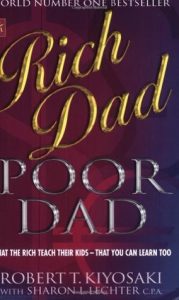Rich Dad Poor Dad is often considered the Bible of passive income books.
I have to admit that when I read Rich Dad Poor Dad in my mid-20s, the book really pumped me up. My main takeaway at that time was that the answer to getting rich was to own real estate and to hold patents, not to work for The Man.
Unfortunately, I took the words in the book too literally, and didn’t really know how to execute on what the author, Robert Kiyosaki, meant. I investigated real estate investment, but for a number of reasons, I didn’t get into it. I had a hundred ideas of what to invent, but didn’t really know how to prove out any of the ideas and execute on them.
So the book collected dust. All the while, Rich Dad Poor Dad: What the Rich Teach Their Kids About Money That the Poor and Middle Class Do Not! had an effect on my subconscious.
Now we are in an interesting time. The economy from the Great Recession forced a lot of people into entrepreneurship. Technologies have improved on the internet, and building a website has become much easier than having to code the entire thing (in the days of my mid-20s). And information is much more easy to attain from blogs, to podcasts, to eBooks, meetups, co-working spaces, and so many other places where people share their experiences freely.
Rich Dad Poor Dad makes so much more sense now. The application of what Robert Kiyosaki wrote about is much easier. Sure, real estate investing is still the same concept. But the idea of other passive income streams is more apparent, and more attainable from my point of view.
Rich Dad Poor Dad is more relevant to me today than it was almost 20 years ago. It is a great book to start with for anyone looking to understand what a passive income stream can do for your future finances and wealth creation. It provides context when reading other books, or listening to podcasts to learn the nitty-gritty details of becoming an entrepreneur, and creating the passive income stream.
This book is a must read. You will likely get some great nuggets of information and inspiration. Or it may mold the way that you think about income and wealth completely. Best of all, it is an easy read. Trust me, if I finished the book and found it interesting in my mid-20’s, then anyone will.


